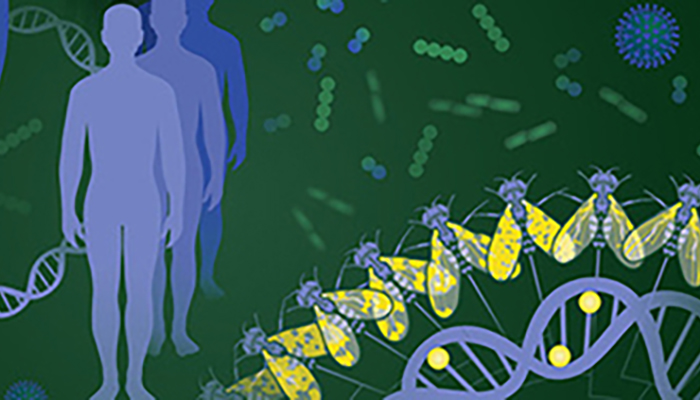Edith Heard previews EMBL’s future directions

EMBL Director General Edith Heard gave alumni around the world an insight into EMBL’s future directions as they celebrated EMBL World Alumni Day 2020 in July.
Approximately 150 former and current staff members joined the annual event, which this year took place online. During World Alumni Hour, participants also heard from Director Matthias Hentze, as he introduced EMBL’s Environmental Research Initiative (ERI) to the alumni community.
Watch Now
Exploring the molecular basis of life in context
Offering a preview of EMBL’s upcoming five-year Programme, ‘Molecules to Ecosystems’, which will begin in 2022, Edith explained that EMBL will remain true to its scientific ambition to understand the molecular basis of life and build on this to understand life in context. This means proudly maintaining EMBL’s tradition of scientific excellence in fundamental research and applying cutting-edge technology and molecular biology expertise to explore new scientific questions. Some of these fascinating questions relate to major societal challenges. She said:
“EMBL can really rise up to the challenge of understanding at a molecular level how organisms exist in the context of environmental parameters, be that microbes in the human gut or marine organisms in oceans that are constantly adapting and responding to environmental changes.”
EMBL’s unique technologies, dynamic staff turnover and interdisciplinary approach, she said, make it ideally placed to harness molecular biology to tackle big scientific questions which will advance our knowledge of the molecular basis of life and inform solutions for societal challenges. EMBL will strive to continue to build collaborations across Europe and drive forward impactful life science research.
Building on strengths and moving into new scientific areas
Building on EMBL’s existing strengths, the upcoming Programme adds several exciting new scientific areas within which life can be explored in a variety of different contexts.
Key areas to build on will include the study of how molecules, cells, tissues, whole organisms and populations respond to environmental changes. Researchers will also seek to elucidate some of the molecular mechanisms that underlie the way microbes, algae, plants and animals on earth respond to environmental changes, both in nature and in the lab. EMBL will advance current research to understand microbes, their functions and their interactions in different communities. Infection biology, from both the host and pathogen perspective, will also feature prominently. The effect that environments have on humans, not only as individuals but as populations, will be another important area of focus.
Addressing how EMBL will approach some of these areas, Edith praised EMBL’s existing and expanding expertise in data science, which will be key to EMBL’s future success. EMBL’s experimental and data services, training and innovation will also be core components of the new Programme.

Fresh initatives and further engagement
Collaboration was central to the genesis of the Programme, and will continue to be important going forward: “It’s about building bridges from molecular biology and bringing together people from different areas to work with us, from epidemiologists and ecologists to mathematicians and theoreticians.”
To support this, EMBL hopes to further its engagement activities, create new sabbatical programmes and launch new initiatives to create exchanges with young scientists. New training activities at EMBL will aim to facilitate a new generation of researchers looking to apply molecular technologies and approaches to explore life in the context of the environment and help to inform solutions.
Edith also highlighted the key role that former staff will play as ambassadors: “alumni are an important part of EMBL because you represent where we came from and where we’ll be going to.”
The Environmental Research Initiative
Following Edith’s talk, Matthias Hentze introduced the Environmental Research Initiative (ERI) to the alumni community, which aims to support the EMBL Programme and enable creative new research across all EMBL sites to tackle some of the biggest environmental challenges.
By harnessing the power of EMBL’s cutting-edge technologies and world-class infrastructure, interdisciplinary collaborative scientific culture, proven research mentorship capabilities, and global strategic partnerships, ERI will empower top research scientists to deepen our understanding of the fundamental principles of the environmental challenges we face, paving the way for innovative, impactful, and sustainable solutions.
If fundraising efforts are successful, ERI will complement 5-year funding from EMBL’s member states. Matthias said: “ERI, drawing on everything that EMBL has and will develop, is a synergistic opportunity for the EMBL community to contribute to something that is urgently needed.” ERI is currently undergoing strategic planning and its roadmap includes three phases: a catalyst project (that will be supported by seed funding from donations this year), a pilot phase, and if proven successful, the third phase, during which new groups funded by donations to ERI will become part of EMBL’s research activities, provided that ERI’s fundraising efforts succeed.
Highlighting the important role that alumni will play in making ERI a success, he said: “We are looking for a network that identifies with the idea and that wants to contribute its own ideas and connections.”
Alumni who missed the day can watch the talks by Edith and Matthias as well as the EMBL Alumni Awards ceremony here.
World Alumni Day 2021 will take place on Friday 16 July 2021 – please mark your diary.
All upcoming alumni events, including the monthly Coffee with EMBL, can be seen in our events listings.